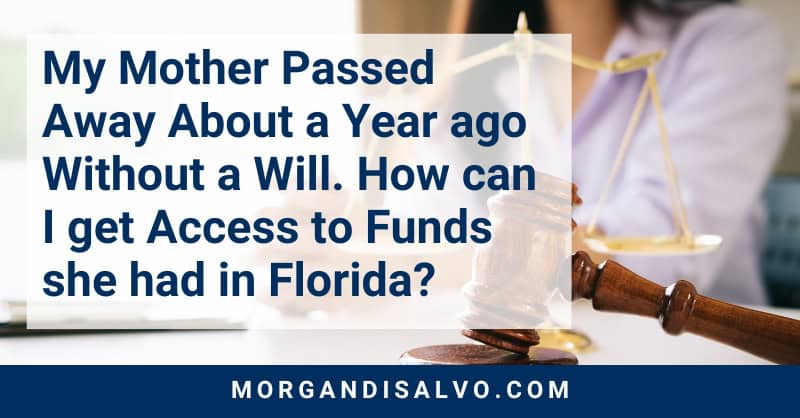Question: My mother passed away about a year ago, and sadly she had not prepared a Will. She has about seven or eight remaining accounts/funds located in Florida, which we would like to receive. How can I get access to those accounts?
Loraine’s Answer: When a person dies without a valid Will, the courts will decide who gets her property and any assets she owned that became part of her probate estate. Assuming that the accounts you mention do not have beneficiary designations or joint owners, then those assets likely became part of her probate estate. However, if you have not checked to see if there are beneficiary designations or joint owners on the accounts, you should do so as soon as possible. Assets that are jointly owned subject to a right of survivorship (which does not mean all jointly owned assets, necessarily) do not become part of the deceased owner’s probate estate. Similarly, assets in an account that is subject to a beneficiary designation will not normally become part of the owner’s probate estate unless the estate is actually designated as the beneficiary. So, check for joint owners and beneficiary designations. If the accounts have no surviving joint owners and no beneficiary designations, they are now part of your mother’s probate estate.
The next step is to figure out which state’s laws will apply to your mother’s probate estate. This will be the state where she had her principal residence for all of her probate estate assets other than real estate that she owned directly and that was located in a state other than the state where she had her principal residence. (Any real estate she owned through a limited liability company or other entity is generally subject to the laws of the state where the owner’s principal residence is located, not necessarily where the real estate is located, but real estate owned directly is subject to the probate laws of the state in which the real estate is located.) If your mother had her primary residence in Georgia, then legally most or all of her probate estate must be administered in Georgia, even if the assets include assets held in accounts at Florida banks. If her principal residence was in Florida, then you’d need to deal with Florida law for most or all of her probate estate.
If she was a Georgia resident, then your options may include:
- Using an affidavit procedure, if the value of the assets in each account is small enough, to state that you are the next of kin, that your mother died without a Will, and that you are entitled to claim the assets in the account under O.C.G.A. Section 7-1-239(b).
- Filing a Petition for Letters of Administration and having the appointed Administrator administer the estate and distribute any remaining assets.
- Filing a Petition for Order Declaring No Administration Necessary, under which a court order will eventually provide for the estate assets to be distributed as agreed upon by the heirs and any creditors.
You’ll need to consult a Florida probate attorney to determine your options if your mother’s principal residence was in Florida. Consult an experienced probate attorney in the applicable state. The attorney can learn more about the situation and guide you on your options and whichever process you decide to use.
Key Estate Planning Takeaways: When a person dies without a Will, the intestacy laws of the state of principal residence apply to the person’s probate estate assets, even if some assets are owned out of state, with the limited exception that real estate may end up subject to the laws of the state where it is located depending on how it is owned.
This “Q&A with Loraine” blog series is inspired by answers from Morgan + DiSalvo Partner Loraine DiSalvo to actual user questions posted by individuals on www.avvo.com. This blog is a more in-depth response than can be given on their site under their character limits for answers. To view the original question and Loraine’s original response, click here.


